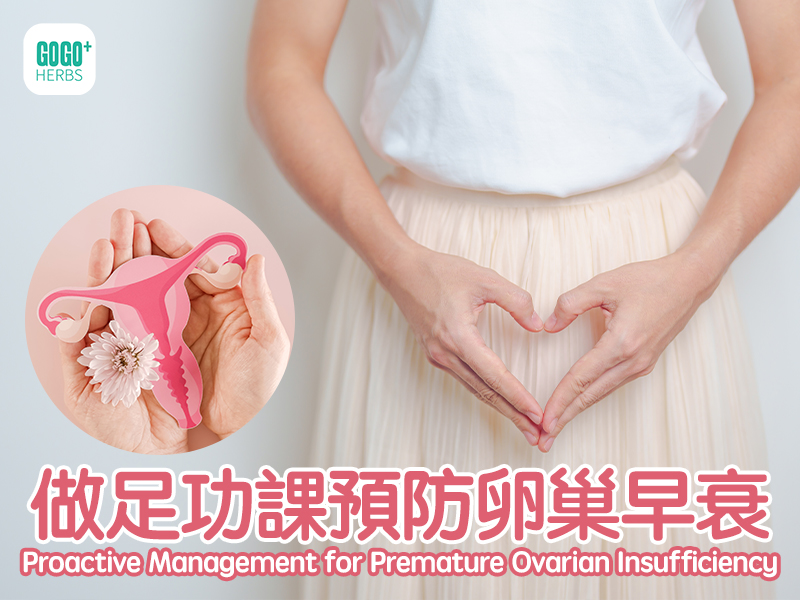
Prevent premature ovarian failure by doing enough homework
Premature ovarian failure, commonly known as early menopause or ovarian dysfunction, is a condition that can lead to infertility.Menstrual cycle irregularitiesPremature ovarian failure (POF), including worsening menopausal symptoms and osteoporosis, has a profound impact on women's health and should not be taken lightly. In recent years, more and more women are facing this problem, with concerns even about its affecting younger women. So what exactly is POF? How does it affect pregnancy and overall health? Let's gain a deeper understanding of this common yet easily overlooked gynecological issue through the professional explanation of an obstetrician-gynecologist.
Many people focus on the definition of "early" in the terms "premature ovarian failure" or "early menopause." Dr. Tang Oi-shan, a specialist in obstetrics and gynecology at Hong Kong Sanatorium & Hospital, points out that early menopause is actually an outward manifestation, often related to premature decline in ovarian function. Generally, women typically enter menopause between the ages of forty and fifty; therefore, if menopause occurs at or before the age of forty, it can be considered a sign of premature ovarian failure.
Even women who have successfully conceived and given birth face certain health risks if they experience menopause before the age of forty. Premature ovarian failure can lead to various health problems.female hormonesThis means that estrogen levels gradually decrease, leading to a series of uncomfortable symptoms. For example, bone loss may accelerate, increasing the risk of osteoporosis in the future; the vagina may become dry, making sexual intercourse more painful; in addition, some women may experience similar symptoms.menopauseSymptoms include hot flashes, night sweats, mood swings, and sleep disturbances. Therefore, premature ovarian failure not only affects fertility but can also have a comprehensive impact on quality of life.
So, what should be done once premature ovarian failure is diagnosed? Dr. Deng explains that ovarian function decline usually occurs gradually, rather than being completely lost instantly. If the patient does not desire fertility, hormone replacement therapy, i.e., estrogen supplementation, is generally recommended to alleviate related discomfort. For women with pronounced menopausal symptoms, this type of medication can effectively reduce hot flashes, insomnia, and other problems. The medical community generally believes that women who stop menstruating before the age of forty should receive hormone therapy, while those who stop menstruating between the ages of forty and fifty need to be assessed based on the severity of their individual symptoms to determine if medication is necessary. However, hormone replacement therapy usually does not need to continue into old age; it is recommended to start medication no later than around the age of fifty, close to the age at which most women naturally stop menstruating, as long-term use of excessive estrogen may increase the risk of side effects such as breast cancer.
Most women typically discover they have ovarian dysfunction only when they experience irregular menstruation or are planning to conceive. Dr. Deng points out that many patients seek medical help after repeatedly failing to conceive, only to discover they have poor ovarian function. Premature ovarian failure can lead to irregular ovulation. Normally, a woman ovulates approximately every 28 to 30 days, but with declining ovarian function, ovulation may become unstable or even cease, thus reducing the chances of conception.
As for how to diagnose premature ovarian failure, doctors usually make a comprehensive judgment through blood tests, ovarian ultrasound examinations, and hormone level assessments. For example, the AMH (anti-Müllerian hormone) level is an important indicator for assessing ovarian ovarian reserve. Combined with clinical symptoms, it helps determine whether a patient's ovarian function is below the level of her age. In addition, an ultrasound examination performed on the 2nd to 3rd day of the menstrual cycle can also observe the number of basal follicles in the ovaries. This value also has age-related reference standards. If it is significantly low, it may also be one of the signs of premature ovarian failure.
However, there are currently no medications that can reverse premature ovarian failure. Especially for women with premature ovarian failure who wish to have children, there is currently no medical method to fully restore the original ovarian function or egg quantity. However, if ovarian function is declining but menstruation has not completely stopped, it is still possible to try artificially stimulating the ovaries to produce more eggs, and then using assisted reproductive technologies such as in vitro fertilization (IVF) to increase the chances of conception. Of course, the success rate will vary depending on individual age, physical condition, and remaining ovarian function, but if the ovaries have severely declined, returning to their original healthy state is essentially impossible.
Regarding the recent observations of an increase in cases of premature ovarian failure (POF), and even its affecting younger women, Dr. Deng Aishan believes that actual clinical statistics do not show a significant upward trend. The difference may stem from the fact that women in the past generally had children at a younger age, making ovarian function problems less noticeable; while modern women generally delay marriage and childbearing, some even considering pregnancy at 35 or 40, making it easier to detect ovarian dysfunction at a younger age. Furthermore, in the past, women lacked awareness of POF, and even if they had related problems, they wouldn't actively seek medical attention, lacking blood tests or detailed examinations, naturally making diagnosis difficult. In contrast, now women are more attentive to their health and more willing to get checked early, resulting in more women discovering POF at a relatively younger age.
In summary, while premature ovarian failure is not uncommon, early detection and appropriate treatment can effectively alleviate symptoms and improve quality of life. For women planning to have children, if ovarian dysfunction is detected, it is recommended to discuss with a doctor as soon as possible to evaluate feasible assisted reproductive options and increase the chances of a successful pregnancy.
Related Post:
Related Products:
-
Sale!
 Out of stock
Out of stock
Unichi – Teddi Lab® Gummy Bears Gummy Bears for Hair Growth Upgraded Sea Salt and Green Titanium Flavour 60 Capsules
Original price was: $170.00.$125.00Current price is: $125.00. Add to basket -
ProVen – Women's Dedicated Probiotic + Cranberry 3600 30 Capsules
Original price was: $198.00.$138.00Current price is: $138.00. Add to basket -
Swisse – Beauty Women's Hair Nutritional Capsules 60 Capsules
Original price was: $168.00.$118.00Current price is: $118.00. Add to basket -
Sale!
 Out of stock
Out of stock
GNC – Cranberry + Probiotic (Women's Formula) 30 billion 30 capsules
Original price was: $250.00.$188.00Current price is: $188.00. Read more








































































